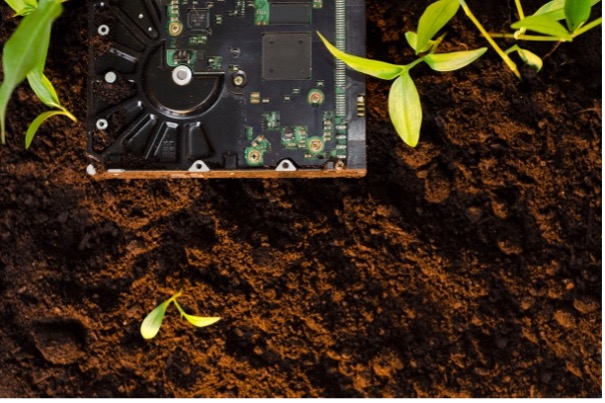As technology continues to advance at a rapid pace, the issue of electronic waste (e-waste) has become a significant challenge for both individuals and businesses. E-waste refers to the disposal of electronic devices such as computers, smartphones, copiers, and printers. We at Applied Innovation understand the critical role that businesses like us play in creating a sustainable future. With that in mind, and as we think about this year’s Earth Day, we’d like to share four reasons why your company should reduce e-waste and promote sustainable practices.
1. Reduce Your Environmental Impact
Only 20 percent of the world’s e-waste is recycled, according to a United Nations estimate, but the majority of electronic devices — including printers, copiers, and cell phones — contain toxic materials like lead and mercury. If not properly disposed of, these toxins can leak into soil and water systems, causing significant environmental damage.
At Applied Innovation, our Secure Shredding Services offer hard drive destruction where your waste is shredded onsite and transported to a recycling facility. For other items, we offer specific disposal and recycling options. For parts, we run a recycling service for the following:
- Circuit boards
- Canon PYPP parts and drums
- An ongoing “boneyard” of spare parts for reuse
For supplies, we collect and recycle machine consumables high in plastic content. In addition, we recycle all foam, cardboard, and pallets, as well as used machines, parts, and consumables for their sheet metal content.


Prioritizing responsible e-waste practices can also impact raw material conservation efforts. Several components of electronic devices such as copper, gold, and silver can be reused and recycled. Reusing these materials can lead to better conservation of resources and reduce the dependence on mining for new materials.
With companies more quickly replacing devices because of rapidly developing technology, it’s even more important to properly dispose of e-waste in order to better protect our natural resources.
2. Demonstrate Company Values
As sustainability becomes an increasingly important issue, consumers are more conscious of the environmental impact of their purchases. Businesses that demonstrate a commitment to sustainability can gain the trust and loyalty of environmentally conscious customers. Alternatively, companies that fail to manage their e-waste responsibly may face public backlash, damaging their reputation and brand image.
According to the Forbes article “Three Ways Emerging Brands Can Build Customer Loyalty,” “…brands can garner even more loyalty from customers when they support community causes, offer environmentally friendly products or have a strong ESG policy. Such programs have shown to influence brand loyalty across the generations from Millennials (65%) to Baby Boomers (49%).”
3. Prevent Legal or Compliance Issues
Across the country, companies are legally required to manage their e-waste responsibly. Non-compliance can result in legal and financial penalties. While there is currently no federal law that regulates e-waste, 25 states have passed laws regarding electronics recycling, including Indiana and Michigan, two of the locations where Applied operates. Because of these laws, electronic devices like copiers and printers shouldn’t be shipped abroad or disposed of via local trash collection.
Security compliance also becomes an issue if electronic devices carrying sensitive data are not recycled or disposed of properly. Employing a trusted recycling service or investing in proper disposal methods can help your company secure data and avoid identity theft. At Applied, our shredding technology offers the ability to completely recycle all the materials without contamination to the environment.
4. Protect Employees and the Public from Health Risks
The toxic materials found in electronic devices can pose a risk to human health, particularly to those directly handling e-waste. Workers who handle e-waste can be exposed to hazardous substances that can cause respiratory problems, skin irritations, and other health issues.
According to the World Health Organization in the article “Soaring e-waste affects the health of millions of children, WHO warns,” illegal dumping and inadequate recycling of e-waste has disastrous health effects, especially for children:
“‘A child who eats just one chicken egg from Agbogbloshie, a waste site in Ghana, will absorb 220 times the European Food Safety Authority daily limit for intake of chlorinated dioxins,’ said Marie-Noel Brune Drisse, the lead WHO author on the report. ‘Improper e-waste management is the cause. This is a rising issue that many countries do not recognize yet as a health problem. If they do not act now, its impacts will have a devastating health effect on children and lay a heavy burden on the health sector in the years to come.’”
What You Can Do Next
E-waste is an issue that businesses cannot afford to ignore. By properly managing e-waste, companies will not only reduce their environmental footprint but also enhance their reputation, remain legally compliant, and conserve valuable resources. This Earth Day, let’s all do our part in promoting responsible e-waste management.
Want tips on e-waste shredding and recycling? Contact our team to get started: appliedinnovation.com/imaging/shredding
To find out more about e-waste recycling in the U.S., visit americanerecycling.org.
